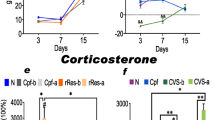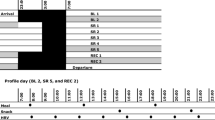Abstract
In order to establish possible different reactions between normal subjects and cocaine addicts to short term exposure to heat, thermal, cardiovascular and pituitary hormonal responses to hyperthermia in sauna were measured in 8 male cocaine addicts (studied after 14 days of abstinence) and in 8 age and weight matched normal men. Subjects sat for 30 min in a sauna room, where the temperature was 90 C and the relative humidity 10%. Physiological and hormonal parameters were measured just before and after sauna and after 30 min of rest at normal (21 C) room temperature. Significant and comparable increments in systolic and diastolic blood pressure, pulse rate and sublingual temperature were observed in the two groups at the end of sauna. All these parameters decreased to normal values after 30 min of rest at normal room temperature. Before sauna, ACTH, cortisol and β-endorphin levels were similar in the two groups, whereas plasma prolactin concentrations were significantly higher in cocaine addicts. All examined hormones rose significantly in the normal controls at the end of sauna. All hormones, except cortisol, returned to the basal levels after 30 min at normal room temperature. In contrast, no significant hormonal responses to hyperthermia were observed at any time point in cocaine addicts. These data do not provide evidence of alterations in the cardiovascular and thermal adaptive responses to hyperthermia in cocaine abusers. On the other hand, the results show an impairment of the ACTH/cortisol, β-endorphin and prolactin responses to hyperthermia in cocaine addicts. It is hypothesized that cocaine abuse produces alterations in the neuroendocrine control of pituitary function persisting after a relatively short drug free period.
Similar content being viewed by others
References
Vescovi P.P., Gerra G., Pioli G., Pedrazzoni M., Maninetti L., Passeri M. Circulating opioid peptides during thermal stress. Horm. Metab. Res. 22:44, 1990.
Vescovi P.P., Maninetti L., Gerra G., Pedrazzoni M., Pioli G., Girasole G., Passeri M. Effect of sauna- induced hyperthermia on pituitary secretion of prolactin and gonadotropin hormones. Neuroendocrinol. Lett. 3:143, 1990.
Leppaluoto J., Huttunen P., Hirvonen J., Vaananen A., Tuominen M., Vuori J. Endocrine effects of repeated sauna bathing. Acta Physiol. Scand. 128:467, 1986.
Figà-Talamanca L., Gualandi C. Hyperthermic syndromes and impairment of the dopaminergic system: a clinical study. Ital. J. Neurol. Sci. 10:49, 1989.
Sanchez C. The effects of dopamine D1 and D2 receptor agonists on body temperature in male mice. Eur. J. Pharmacol. 171:201, 1989.
Vybiral S., Jansky L. The role of dopaminergic pathways in thermoregulation in the rabbit. Neuropharmacology 28:15, 1989.
Loscher W., Whitte U., Fredow G., Ganter M., Bickhardt K. Pharmacodynamic effects of serotonin (5-HT) receptor ligands in pigs: stimulation of 5-HT2 receptors induces malignant hyperthermia. Naun. Schm. Arch. Pharmacol. 341:483, 1990.
Nash J.F. jr, Meltzer H.Y., Gudelsky J.A. Selective cross-tolerance to 5-HT1A and 5-HT2 receptor mediated temperature and corticosterone responses. Pharmacol. Biochem. Behav. 38:781, 1989.
Schmidt C. J., Black C.K., Abbate G.M., Taylor V.L. Methylenedioxymetanphetamine-induced hyperthermia and neurotoxicity are independently mediated by 5-HT2 receptors. Brain Res. 529:85, 1990.
Kisc S.J., Kleinert R., Minauf M., Gilbert J., Walter J.F., Slimovitch C., Maurer E., Rezvani Y., Myers R., Hornykiewicz O. Brain neurotransmitter changes in three patients who had a fatal hyperthermia syndrome. Am. J. Psychiatry 147:1358, 1990.
Kubarko A.I., Pereverzev V.A., Balakleevskii A.I., Gomolko N.N. Analysis of changes in serotonin, histamine and prostaglandin E2 levels in cerebrospinal fluid and body tissues during hyperthermia of various origins. Vopr. Med. Khim. 37:26, 1991.
Vescovi P.P., Pedrazzoni M., Maninetti L., Gerra G., Passeri M. Impaired prolactin response to hyperthermia in heroin addicts. Acta Endocrinol. (Copenh.) 123:619, 1990.
Vescovi P.P., Pedrazzoni M., Gerra G., Maninetti L., Passeri M. Impaired ACTH and β-endorphin response to sauna-induced hyperthermia in heroin addicts. Acta Endocrinol. (Copenh.) 121:484, 1989.
Vescovi P.P., Michelini M., Maninetti L., Pedrazzoni M., Magnani G., Pezzarossa A., Passeri M. Secretion of beta- endorphin, ACTH and cortisol after hyperthermic stress in chronic alcoholics. Alcologia 3:267, 1991.
Roberts J.R., Quattrocchi E., Howland M.A. Severe hyperthermia secondary to intravenous drug abuse. Am. J. Emerg. Med. 2: 373, 1984.
Dackis C.A., Gold M.S. New concepts in cocaine addiction: the dopamine depletion hypothesis. Neurose Biobehav. Rev. 9:469, 1985.
Memo M., Pradhan S., Hanbauer I. Cocaine-induced supersensitivity of striatal dopamine receptors: role of endogenous calmodulin. Neuropharmacology 20:1145, 1981.
Schubert J., Fyro B., Nyback H., Sedvall G. Effects of cocaine and amphetamine on the metabolism of tryptophan and 5-hydroxytryptamine in mouse brain in vivo. Pharm. Rev. 37:860, 1970.
Friedman E., Gershon S., Rotrosen J. Effects of acute cocaine treatment on the turnover of 5-hydroxytryptamine in rat brain. Br. J. Pharmacol. 54:61, 1975.
Ho B.T., Taylor D.L., Estevez V.S., Englert L.F., Mc Kenna M.L. Behavioral effects of cocaine-metabolic and neurochemical approach. In: Elliswood E.H.jr, Kilbey M.M. (Eds.), Cocaine and other Stimulans. Plenum Press, New York, 1977, p. 229.
Taylor D., Ho B.T. Neurochemical effects of cocaine following acute and repeated injecion. J. Neurosci. Res. 3:95, 1977.
Former E.J., Estilow S. Cocaine influences beta-endorphin levels and release. Life Sci. 43:309, 1989.
Moldow R.L., Fischman A.J. Cocaine induced secretion of ACTH, beta- endorphin and corticosterone. Peptides 8:819, 1989.
Mendelson J.H., Mello M.K., Tcoh S.K., Ellingboe J., Cochin J. Cocaine effects on pulsatile secretion of anterior pituitary, gonadal and adrenal hormones. J. Clin. Endocrinol. Metab. 69:1256, 1989.
Cocores J.A., Dackis C.A., Gold M.S. Sexual dysfunction secondary to cocaine abuse in two patients. J. Clin. Psychiatry 47:384, 1986.
Gawin F.H., Kleber H.D. Neuroendocrine findings in chronic cocaine abusers: a preliminary report. Br. J. Psychiatry 247:1256, 1985.
Mendelson J.H., Teoh S.K., Lange U., Mello N.H., Weiss A., Skupy A.S.T. Hyperprolactinemia during cocaine withdrawal. In: Harris L.S. (Ed.), Problems of Drugs Dependance 1987. NIDA Res Monogr Ser 81 Washington DC: U.S. Government Printing Office, 1988, p.67.
Swartz C.M., Breen K., Leone F. Serum prolactin levels during extended cocaine abstinence. Am. J. Psychiatry 147:777, 1990.
Gawin F.H., Ellinwood E.H. Cocaine and other stimulants. N. Engl. J. Med. 318:1173, 1988.
Bloom A.S., Tseng L.F. Effects of beta-endorphin on body temperature ion mice at different ambient temperature. Peptides 2: 293, 1981.
Clark W.G. Influence of opioids on central thermoregulatory mechanisms. Pharmacol. Biochem. Behav. 10:609, 1979.
Clark W.S. Effects of opioid peptides on thermoregulation. Fed. Proc. 40:2754, 1981.
Wong T.M., Koo A., Li C.H. β-Endorphin: vasodilating effect on the microcirculatory system of hamster cheek pouch. Int. J. Peptide Res. 18:420, 1981.
Holaday J.W., Wei E., Loh H.H., Li C.H. Endorphins may function in heat adaptation. Proc. Natl. Acad. Sci. USA 75:2923, 1978.
Stewart J., Eikelboom R. Stress masks the hypothermic effect of naloxone in rats. Life Sci. 25:1165, 1979.
Rossier J., French E.D., Rivier C., Ling C., Guillemin R., Bloom F.E. Foot shock induced stress increase β-endorphin levels in blood but not in the brain. Nature 270: 618, 1977.
Robins H.I., Kalin N.H., Shelton S.E., Martin P.A., Shecterle L.M., Barksdale C.M., Neville A.J., Marshall J. Rise in plasma beta-endorphin, ACTH and cortisol in cancer patients undergoing whole body hyperthermia. Horm. Metab. Res. 19:441, 1987.
Tuomisto J., Mannisto P. Neurotransmitter regulation of anterior pituitary hormones. Pharm. Rev. 37:249, 1985.
Author information
Authors and Affiliations
Rights and permissions
About this article
Cite this article
Vescovi, P.P., Coiro, V., Volpi, R. et al. Hyperthermia in sauna is unable to increase the plasma levels of ACTH/Cortisol, ß-endorphin and prolactin in cocaine addicts. J Endocrinol Invest 15, 671–675 (1992). https://doi.org/10.1007/BF03345813
Received:
Accepted:
Published:
Issue Date:
DOI: https://doi.org/10.1007/BF03345813




